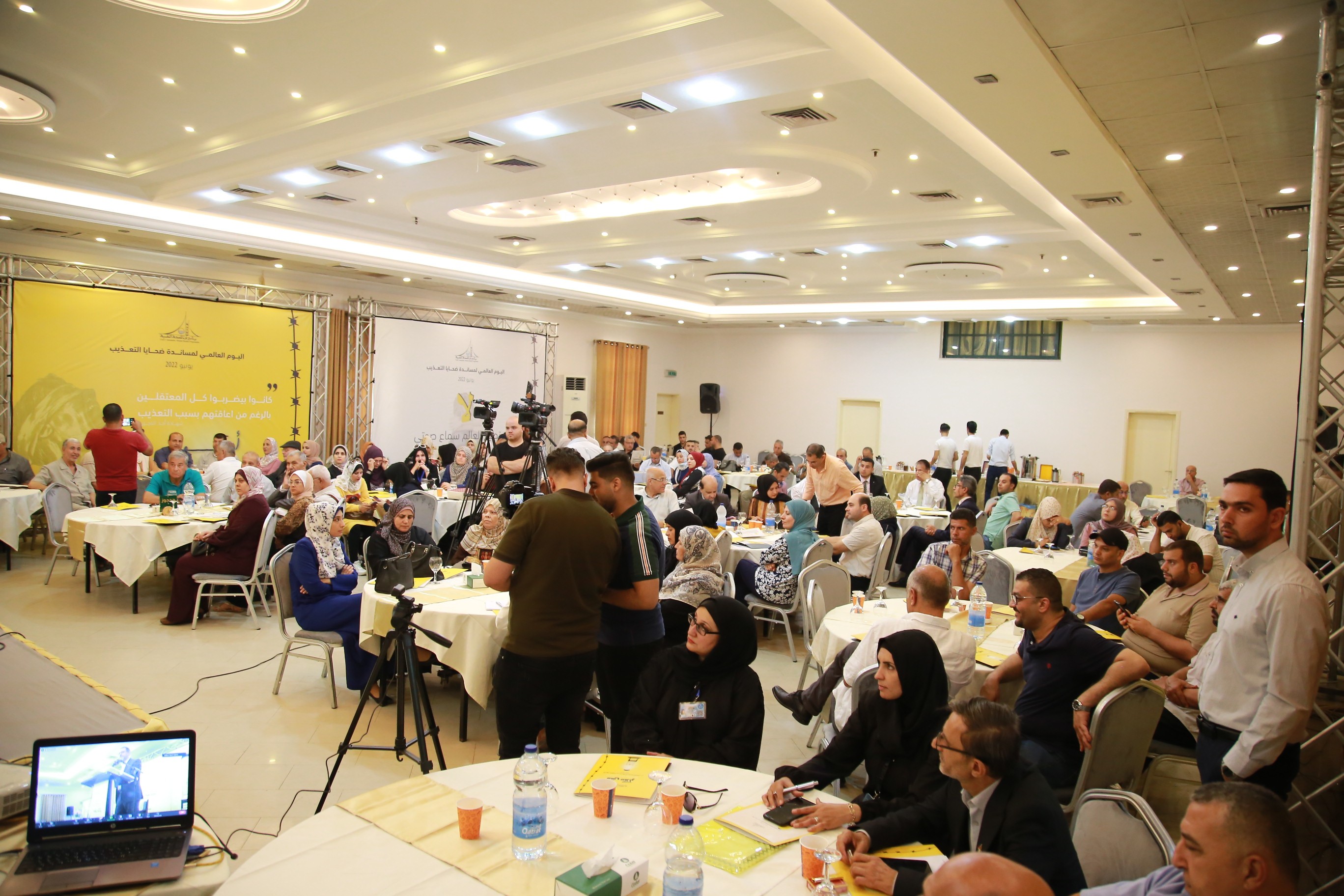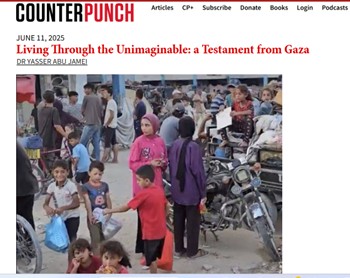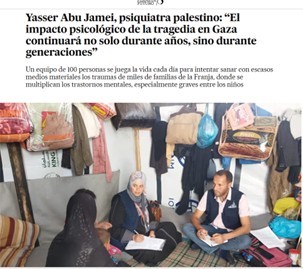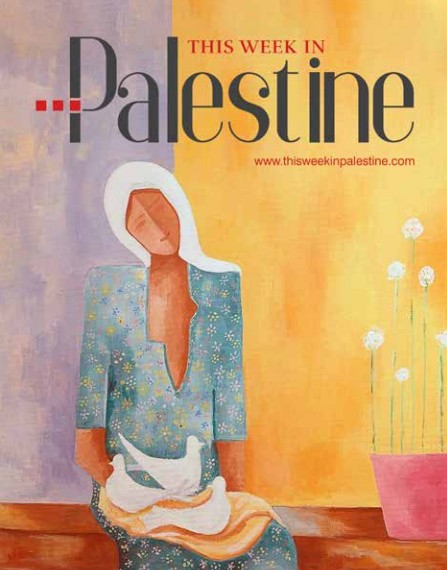
“Workshop: International Day in Support of Victims of Torture: ‘Untold Stories’”
Building on its consistent efforts to promote mental health and human rights GCMHP has conducted on Monday, 27, 2022 a workshop on the international Day In Support of Victims of Torture.
The workshop, run under the rubric “Untold Stories”, comes as part of the campaign that GCMHP has launched to mark this occasion, which is celebrated every year on the 26th of June.
Presented the opening session Dr Yasser Abu Jamei, Director General, who gave a speech on the role of GCMHP in supporting victims of torture and the relationship between the psychosocial impact of torture, as well as GCMHP’s role in providing therapeutic interventions and raising community awareness. Dr Abu Jamei also spoke of the speciality of the Palestinian situation due to the existence of the occupation and the exposure of large numbers of the Palestinian population to arrest and torture since 1967, leaving serious psychological consequences on the victims, including the phenomena of identification with the aggressor, in which the victims exercise the same roles that were exercised against them when they have control over others.
He also stressed that the psychological consequences of what the Palestinians go through have become very clear in the composition of Palestinian society, explaining the mechanisms used in intervening with victims of torture in order to rehabilitate and reintegrate them in the society.
The workshop also provided a space for sharing experiences by specialists and professionals in mental health and human rights, through a discussion panel that included 4 speakers from different local and international organizations.
Professor Shalhoub, Chiar in Law – Queen Mary University of London, presented a paper entitled: “Critical Readings in Prisons: Pysical and Psychological Detention,” in which she talked about the experience of prisoners inside prison and after being freed and how former prisoners remain hostages to psychological imprisonment even after release, adding that “prison is not considered a random procedure, but rather is a colonial strategic choice to define the parameters of society according to the blueprint of the occupation.” “Prison aims to reproduce a new Palestinian group designed by the occupation’s [vision], or is used as an alternative to genocide,” she added.
Then, the floor was given to Mr Abdelnaser Ferwana, Former prisoner and prisoners’ affairs specialist, to present facts about the situation of prisoners, especially those who are underage. He said that there as a serious correlation between arrest and torture, and that no Palestinian, among the nearly one million citizens who have experienced arrest, has not tasted the bitterness of physical or psychological torture and moral abuse as well as various forms of torture that “claimed the lives of 229 Palestinian prisoners since 1976”.
“Torture is not limited to those who have been arrested, but their families and even their friends and neighbors are victims of torture as well,” Ferrwana said, explaining that torture does not aim - as announced by the occupation - to extract confessions only, but also aims to destroy the Palestinian and national self, destroy the human body and soul, destroy personality, change behaviour, way of thinking, and political beliefs, and influence the individual and the group,” he added.
Mr Belal Odei, Social worker at the Palestinian Counseling Center, presented a paper entitled: "Torture of Children by the Israeli Occupation and the Case of the Prisoner Ahmed Al-Manasra as a Model: Home arrest and Financial Fines as a Tool of Torture against Children and Their Families.” The paper talked of forms of torture practised by the Israeli occupation against children.
“Arresting large numbers of children during the past years was in an attempt to distort the future of the coming generations through negatively influencing their mental health by instilling frustration and helplessness in children,” he explained.
Dr Muhammad Darabiah, GCMHP psychiatrist, presented the philosophy and mission of Gaza Community Mental Health Programme, which considers human rights as an integral component in mental provision. He provided examples from GCMHP work on how human rights are consolidated through mental health work such providing prisoners, victims of torture, and victims of trauma and violence with assistance, and reintegrating them into the community. He also mentioned GCMHP’s awareness work with law enforcement personnel intended to make sure that they observe human rights.
Victims of Torture – Real Life Stories
1. (Um Dhia Al-Agha) is a 72 mother whose husband and three sons were imprisoned. One of her sons, Diaa, was imprisoned when he was 16 and is spending a life sentence. Um Dia talked of how she was humiliated every time she went to visit her children in the Israeli prisons. She was forced unreasonably to take her clothes off, and sometimes even her underwear, though she would wear special clothing that included no metal parts so as to pass through the metal detector. She also spoke of the incredibility psychological pressure that was excercised against her. “I was in distress due to the aggressive way they searched me, and I felt I was in a bad need to go to the bathroom, though I knew that this would make me lose the rare opportunity of seeing my son. And in deed, as I finished using the bathroom, the visit time was already over. I burst into tears because it was the first time in three years to see him. It was the first time after they had lifted the ban on my son’s visits”.
2. Mr Muhammad Alyan, a 60-years-old father, spoke of his experience of losing his son Baha. He said being “a father of a martyr” does not necessarily mean that you are involved in military activities or your [slain] son is. “It is likely to lose your son because he mistook the right route by walking in an Israeli street one or just because he had put his hand in his pocket, raising suspicion for attempting to take a knife out. Then the occupation forces follow this up by making punitive measures against the martyr’s family to cover up for their crime and prove that what they did was not wrong.”
3. Hisham Abu Hawash, shared his experience as a former prisoner and spoke of the deliberate medical neglect and physical and psychological torture of prisoners, making clear that torture does not end once a person is released from prison, but continues in various forms outside the bars. He explained that the liberated prisoners and their families live in constant fear of re-arrest, and community avoids the released prisoners for fear of meeting the same fate. Abu Hawash added that when a freed prisoner tries to integrate into the community or start a project to support his children, he is re-arrested and loses his job. "Even my friends left me out of fear of being arrested,” he said.
The workshop resulted in a group of recommendations:
Promoting awareness of the need to seek psychological assistance by victims of torture;
Supporting and assisting victims of torture, especially women and children;
Documenting all crimes of torture with the aim of redressing victims and stopping torture;
Integrating psychotherapy and the use of effective therapeutic interventions for torture survivors who developed PTSD;
Providing secure and safe services, including rehabilitation and social integration for victims of torture;
lobbying all concerned parties to abide by the international law and all the laws and agreement that forbid torture;
Training the concerned groups, such as law enforcement personnel, on the concepts of human rights and the rights of detainees;
Guaranteeing consistency, rather than irregularity, in the efforts done to attend to the issue of prisoners and victims of torture;
There is a need to be to form governmental and non-governmental organizations to provide psychological, social and economic support to the families of child prisoners and to try all possible ways to put an end to the deliberate and systematic torture against child prisoners,
Providing a more holistic and specialized mental health and psychosocial support to child prisoners and making their issues a priority in mental health and legal organizations.




Read Comments
Steven Rich
March 10, 2019Omnis iste natus error sit voluptatem accusantium nam libero tempore, cum soluta nobis est eligendi optiocumque nihil impedit quo minus id quod maxime.
Van Wimbilton
March 10, 2019Natus error sit voluptatem accusantium nam libero tempore, cum soluta nobis eligendi optio cumque nihil impedit quo minus id quod maxime.